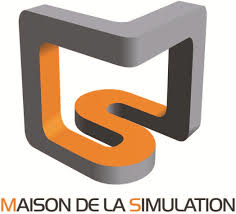15th VI-HPS Tuning Workshop (MdS, Saclay, France)
Date
Monday 7th - Thursday 10th April, 2014.
Location and How to Get There
The workshop will take place near Paris, France, at Maison de la Simulation (MdS), Digiteo Labs, building 565, CEA Saclay, 91191 Gif-sur-Yvette.
- How to get to MdS: pdf html
- Search your itinerary for any public transport in and around Paris: vianavigo (bus stop "CEA porte 306" is close to MdS)
Organizing Institutions
Goals
This workshop is organized by VI-HPS for the French PRACE Advanced Training Centre hosted by Maison de la Simulation to:
- give an overview of the VI-HPS programming tools suite
- explain the functionality of individual tools, and how to use them effectively
- offer hands-on experience and expert assistance using the tools
Programme Overview
Presentations and hands-on sessions are on the following topics:
- Setting up, welcome and introduction
- Score-P instrumentation and measurement
- Scalasca automated trace analysis
- Vampir interactive trace analysis
- TAU performance system
- MAQAO performance analysis & optimisation
- Measurement & analysis of heterogeneous HPC systems using accelerators
A brief overview of the capabilities of these and associated tools is provided in the VI-HPS Tools Guide.
The workshop will be held in English and run from 09:00 to not later than 18:00 each day, with breaks for lunch and refreshments. There is no fee for participation, however, participants are responsible for their own travel and accommodation.
Classroom capacity is limited, therefore priority will be given to applicants with MPI, OpenMP and hybrid OpenMP+MPI parallel codes already running on the workshop computer systems, and those bringing codes from similar systems to work on.
Programme in Detail
| Day 1: | Monday 7 April | |
| 09:30 | (registration & set-up of
course accounts on workshop computers)
[Optional] Individual preparation of participants' own codes. |
|
| 12:30 |
(lunch) | |
| 13:30 | Welcome
| |
| 15:00 | (break) | |
| 15:30 |
Lab setup | |
| 17:30 | (adjourn) | |
|
|
||
| Day 2: | Tuesday 8 April | |
| 09:00 | Score-P instrumentation & measurement
|
|
| 10:30 | (break) | |
| 11:00 | Score-P analysis scoring & measurement filtering
|
|
| 12:30 | (lunch) | |
| 13:30 | Hands-on coaching to apply tools to analyse participants' own code(s). | |
| 17:00 | Review of day and schedule for remainder of workshop | |
| 17:30 | (adjourn) | |
|
|
||
| Day 3: | Wednesday 9 April | |
| 09:00 |
Scalasca automated trace analysis [Marc-André Hermanns, GRS] |
|
| 10:30 | (break) |
|
| 11:00 |
MAQAO performance analysis and optimisation [Andrés Charif-Rubial, Jean-Baptiste Besnard & Emmanuel Oseret, UVSQ] |
|
| 12:30 | (lunch) | |
| 13:30 | Hands-on coaching to apply tools to analyse participants' own code(s). | |
| 17:00 | Review of day and schedule for remainder of workshop | |
| 17:30 | (adjourn) | |
|
|
||
| Day 4: | Thursday 10 April | |
| 09:00 |
TAU performance system [Sameer Shende, UOregon] |
|
| 10:30 | (break) | |
| 11:00 |
Concluding session |
|
| 12:30 | (lunch) | |
| 13:30 | Hands-on coaching to apply tools to analyse participants' own code(s). | |
| 15:00 | (break) | |
| 15:30 | (adjourn or continue with work to 16:30) |
Hardware and Software Platforms
Poincaré: this cluster, owned by Maison de la Simulation and operated by IDRIS, will be used for the hands-on exercises with accounts provided during the workshop:
- 92 compute nodes "poincare[001-092]" (clallmds) comprised of Sandy Bridge E5-2670 (2.60GHz, dual-socket, 8 cores per socket) and 32 GB shared memory
- 4 GPU nodes "poincaregpu[01-04]" (clgpu), dual-socket Sandy Bridge E5-2670, 64 GB memory per node, GPU Tesla K10/K20 (CUDA Capability 3.0, 3.5 GB per GPU)
- 4 interactive frontends "poincareint[01-04]", dual-socket Sandy Bridge E5-2670, 32 GB memory per node
- 2 file systems: gpfs1l, 7 TB accessible via HOME; 37 TB gpfsdata
- software: RedHat Linux, Intel & GNU compilers, Intel MPI,....
Curie: Intel Xeon X5760 (Nehalem) eight-core processors and Nvidia T20A GPUs, Bullx Linux, Bull MPI, Intel & GCC compilers. Existing account required!
The local system Poincaré is the primary platform for the hands-on part of the workshop, where Intel compilers and Intel MPI are supported: . Participants with applications using CUDA (with MPI and/or OpenMP) are encouraged to analyse performance on the GPU nodes of Poincaré. Other systems, e.g. Curie, where up-to-date versions of the tools are installed can also be used when preferred, though support may be limited. Participants are expected to already possess user accounts on non-local systems they intend to use, and should be familiar with the procedures for compiling and running parallel applications on those systems.
Registration
Registration is via the PRACE training portal. Note: the number of participants is limited, and preference will be given to those bringing parallel application(s) to analyse and tune as part of the workshop.
Accommodation
Contact
Tuning Workshop Series
Brian Wylie
Jülich Supercomputing Centre
Phone: +49 2461 61-6589
Email: b.wylie@fz-juelich.de
Local Arrangements
Michel Kern
Maison de la Simulation
Phone: +33 1 69 08 58 32
Email: michel.kern@inria.fr
Aurélie Monteiro
Maison de la Simulation
Phone: +33 1 69 08 60 52
Email: aurelie.monteiro@cea.fr





